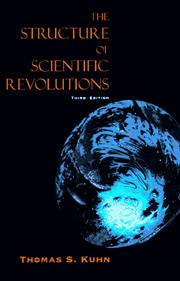| Listing 1 - 2 of 2 |
Sort by
|

ISBN: 0226458083 9780226458083 0226458075 9780226458076 Year: 1996 Publisher: Chicago (Ill.) : University of Chicago press,
Abstract | Keywords | Export | Availability | Bookmark
 Loading...
Loading...Choose an application
- Reference Manager
- EndNote
- RefWorks (Direct export to RefWorks)
Thomas S. Kuhn's classic book is now available with a new index. "A landmark in intellectual history which has attracted attention far beyond its own immediate field. . . . It is written with a combination of depth and clarity that make it an almost unbroken series of aphorisms. . . . Kuhn does not permit truth to be a criterion of scientific theories, he would presumably not claim his own theory to be true. But if causing a revolution is the hallmark of a superior paradigm, [this book] has been a resounding success." --Nicholas Wade, 'Science' "Perhaps the best explanation of [the] process of discovery." --William Erwin Thompson, 'New York Times Book Review' "Occasionally there emerges a book which has an influence far beyond its originally intended audience. . . . Thomas Kuhn's 'The Structure of ' 'Scientific Revolutions' . . . has clearly emerged as just such a work." --Ron Johnston, 'Times Higher Education Supplement' "Among the most influential academic books in this century." -- 'Choice' --One of "The Hundred Most Influential Books Since the Second World War," 'Times Literary Supplement' Thomas S. Kuhn was the Laurence Rockefeller Professor Emeritus of linguistics and philosophy at the Massachusetts Institute of Technology. His books include 'The Essential TensionBlack-Body Theory and the ' 'Quantum Discontinuity, 1894-1912;' and 'The Copernican ' 'Revolution.'
Science --- History. --- Philosophy. --- Normal science --- Philosophy of science --- History --- Philosophy --- Science - Philosophy --- Science - History --- Q 175 Philosophy. Methodology (General works)
Book
ISBN: 9782271069009 2271069009 2271091357 Year: 2009 Publisher: Paris : CNRS,
Abstract | Keywords | Export | Availability | Bookmark
 Loading...
Loading...Choose an application
- Reference Manager
- EndNote
- RefWorks (Direct export to RefWorks)
Le marxisme traditionnel a désormais montre ses limites. Il peinait à expliquer, à partir de l'organisation économique des sociétés modernes, la domination masculine ou les sujétions ethniques et culturelles. Mais comment, dès lors, se réapproprier les thèmes et les concepts jadis élaborés dans le cadre de la " critique du capitalisme " encore indispensables à la compréhension de notre monde ? Sur quelle base la longue culture anticapitaliste pourrait-elle être actualisée ? Stéphane Haber, revisitant certains textes fondamentaux de la philosophie sociale, de Hegel à Habermas et Honneth, montre quel rôle essentiel la catégorie d'aliénation, promue par Marx en 1844, peut encore jouer. Approfondi, enrichi, contourné, parfois même rejeté au cours de son histoire, le lien entre analyse de l'aliénation et critique du capitalisme, dont différents avatars font ici l'objet d'une recherche précise, reste aujourd'hui une puissante source d'inspiration intellectuelle et pratique. A l'heure de la mondialisation néolibérale et de ses crises, ce peut être l'une des tâches inattendues de l'histoire de la philosophie que d'éclairer l'arrière-plan de cette vitalité persistante.
Political science --- History, 20th Century --- HX 519 Communism/socialism --- Philosophy, Marxist. --- Alienation (Philosophy) --- Philosophie marxiste --- Aliénation (Philosophie) --- Science politique --- Philosophy. --- Philosophie --- Marx, Karl, --- Criticism and interpretation. --- Philosophy, Marxist --- Philosophy --- Criticism and interpretation --- Political Philosophy --- Marxism --- Aliénation (Philosophie) --- Political science - Philosophy --- Marx, Karl, - 1818-1883 - Criticism and interpretation --- Marxism. --- Marx, Karl (1818-1883) --- Habermas, Jürgen (1929-....) --- Honneth, Axel (1949-....) --- Philosophie sociale --- Aliénation sociale --- Réification --- Capitalisme --- Critique et interprétation --- Marx, Karl, - 1818-1883
| Listing 1 - 2 of 2 |
Sort by
|

 Search
Search Feedback
Feedback About
About Help
Help News
News